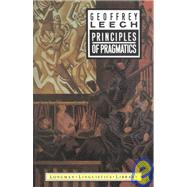
Note: Supplemental materials are not guaranteed with Rental or Used book purchases.
Purchase Benefits
What is included with this book?
| Preface | |
| A note on symbols | |
| Introduction | |
| Historical preamble | |
| Semantics and pragmatics | |
| General pragmatics | |
| Aspects of speech situations | |
| Rhetoric | |
| A set of postulates | |
| Semantic representation and pragmatic interpretation | |
| Rules and principles | |
| Convention and motivation | |
| The relation between sense and force | |
| Pragmatics as problem-solving | |
| Conclusion | |
| Formalism and functionalism | |
| Formal and functional explanations | |
| Biological, psychological, and social varieties of functionalism | |
| The ideational, interpersonal, and textual functions of language | |
| The ideational function: discreteness and determinacy | |
| Examples of 'overgrammaticization' | |
| Conclusion | |
| The interpersonal role of the Cooperative Principle | |
| The Cooperative Principle (CP) and the Politeness Principle (PP) | |
| Maxims and Quantity and Quality | |
| Maxim of Relation | |
| The Hinting Strategy and anticipatory illocutions | |
| Maxim of Manner | |
| The Tact Maxim | |
| Varieties of illocutionary function | |
| Searle's categories of illocutionary acts | |
| Tact: one kind of politeness | |
| Pragmatic paradoxes of politeness | |
| Semantic representation of ddeclaratives, interrogatives and imperatives | |
| The interpretation of impositives | |
| Pragmatic scales | |
| Tact and condescension | |
| A survey of the Interpersonal Rhetoric | |
| Maxims and politeness | |
| Metalinguistic aspects of politeness | |
| Irony and banter | |
| Hyperbole and litotes | |
| Conclusion | |
| Communicative Grammar: an example | |
| Communicative Grammar and pragmatic force | |
| Remarks on pragmatic metalanguage | |
| Some aspects of negation and interrogation in English | |
| Implications of politeness | |
| Conclusion | |
| Performatives | |
| The Performative and Illocutionary-Verb Fallacies | |
| The speech act theories of Austin and Searle | |
| Illocutionary performatives: descriptive and non-descriptive approaches | |
| Illocutionary performartives and oratio obliqua | |
| The pragmatics of illocutionary performatives | |
| The performative hypothesis | |
| The extended performative hypothesis | |
| Conclusion | |
| Speech-act verbs in English | |
| Locutionary, illocutionary, and perlocutionary | |
| A survey of speech-act verb clauses | |
| Is there a separate class of performative verbs? | |
| A semantic analysis of some illocutionary verbs | |
| Assertive verbs | |
| Conclusion | |
| Retrospect and prospect | |
| References | |
| Index | |
| Table of Contents provided by Publisher. All Rights Reserved. |
The New copy of this book will include any supplemental materials advertised. Please check the title of the book to determine if it should include any access cards, study guides, lab manuals, CDs, etc.
The Used, Rental and eBook copies of this book are not guaranteed to include any supplemental materials. Typically, only the book itself is included. This is true even if the title states it includes any access cards, study guides, lab manuals, CDs, etc.